Entrepreneurial Insights
By Stephen Wilson
The Dyer Center for Innovation and Entrepreneurship invited three guests to the College to share their diverse entrepreneurial wisdom with students.
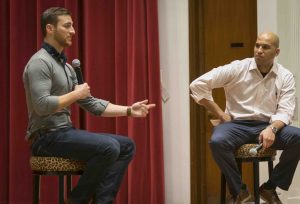
Justin Kamine ’11 and DYER Center Director Yusuf Dahl at Colton Chapel
Seifi Ghasemi H’17 is chairman, president, and chief executive officer of Air Products, an international corporation with a unique portfolio of atmospheric, process, and specialty gases. Ghasemi has built his distinguished career on the foundation of his undergraduate education at the Engineering School at Abadan Institute of Technology (Iran), which was created through an innovative partnership between Abadan and Lafayette College in the 1950s.
Justin Kamine ’11 is co-founder of KDC Ag, a technology company destined to transform the food, waste, and agricultural industries by converting more than 30 tons of fresh food waste into fertilizer and animal feed in just three hours.
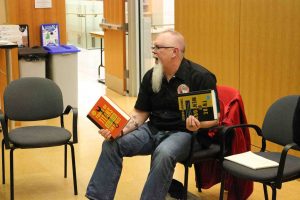
Troy Reynard
Troy Reynard is owner of Cosmic Cup, a College Hill staple for coffee lovers, and Two Rivers Brewing Company, a downtown Easton brew pub that specializes in craft beer and farm-to-table food.
Here is some of what they said to motivate student entrepreneurs.
Liberal Arts Matter
SG: A solid and comprehensive education in liberal arts prepares you to recognize opportunities and move in new and unexpected directions. It makes you well-rounded, well-informed, and curious, and able to think clearly and independently. You develop the thought process to see the bigger picture. To be innovative, compassionate, and more caring. Because of my grounding in the liberal arts, I continue to read, educate myself, and observe life around me and see the forces that shape the world’s events from a different perspective.
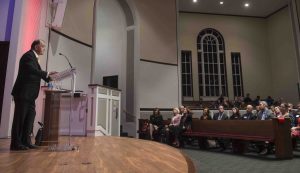
Seifi Ghasemi H’17
Learn What You Don’t Want to Do
JK: Always wanted to be an entrepreneur. After I graduated, I found a job at a well-known global energy company, working on coal power plants. It just wasn’t for me. I was the environmentalist who wanted to save the world. I lasted in that job for two months before striking out on my own where I could ask the big questions and better understand why society operates in a certain way. It’s where I found the challenges that my company is now addressing.
TR: I never thought I’d own my own businesses. I was always curious about things and loved to read. I was the first in my family to attend college, but my GPA was low, and eventually I left. I joined the Army and was enlisted for two years. There I learned discipline, working as an auto parts clerk. I’d give out the new parts when parts broke. It was there I learned what I didn’t want to do. I should use my brain instead of breaking my body through manual labor. Luckily, the Army gave me money for college. I earned a B.A. from Kutztown.
Courage Matters
SG: Dr. (Walter) Gross (’59), President of Abadan, and several key professors moved with their families from Easton to teach at the college in Iran. I attended the school from 1960-66 and was educated by these fine people. I have many memories of professors and had tears in my eyes when I had a reunion with Prof. [Bill] Kirby [’59]. He like many others had the courage to pick up their families, go to a foreign land, endure 120-degree heat, and educate young people of another country. I do wish they were here tonight, so they could see they educated a young man who became the leader of the largest company in Lafayette College’s own backyard.
TR: We opened the coffee shop in 2005. At some point you realize it is one shop and have to decide how to grow. So we had to decide if we add locations or do something different. We were about to sign a lease for a second Cosmic Cup in Allentown, but we paused. You need bravery to put yourself out there and put everything on the line. So we wrote a business plan, shopped it to banks, found a location, and opened a brew pub.
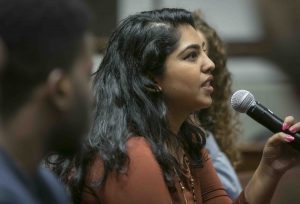 Facing Down Challenges
Facing Down Challenges
JK: Life can be tough. We face difficult tasks and our own anxieties and self-doubts. But you have to keep doing what you can do. No one is grading life. There is no checklist. That belief is only what we perceive. We must be grateful for what we have and where we are. I think it is important, during these ups and downs, to complete a self-audit and focus on strengths. To find out that you are really good at five things and then to put yourself in the position to best win. I’m good with people. How can I make that my job? How can I use every day to put that into practice?
TR: You are going to make mistakes and constantly are thrown curve balls, but you have to keep an open mind and figure things out. It took three engineers to figure out how to support the tanks for our brewery. When the ceiling leaks, you have to figure out the 20-year fix. And there is a cost to the freedom of being your own boss. There is a flexibility to work when you want, but you can never shut it off. Things always happen. But no one retires at 55, so do something that you really like and want to do. Build a good team, create a structure that makes sense for that team, and give them the freedom to do their jobs.
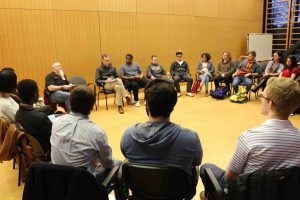 Core Traits
Core Traits
SG: I learned that the only element of long-term competitive advantage is my degree of commitment and motivation in the enterprise. Your competitors have technology and smart people. So it is my job to create an environment and culture. Employees are not just coming to work. It is a leader’s job to create that environment. If I am sincere, create a clear plan, set an example, work hard, and dedicate my life, then I know my employees’ performances will improve beyond expectations. I want it to feel like our company is made up of 5,000 or 10,000 CEOs.
Fall in Love
SG: On Tuesday, January 15, 1957, a curious 12-year-old boy from a remote corner of an ancient land put on his best clothes because important visitors were coming to school. Students gathered in the back hall to welcome visitors from the U.S. Information Agency. Four people stood on the stage and explained U.S. history, including the Declaration of Independence, Revolutionary War, and wave of immigrants. They showed a movie with footage of the Golden Gate Bridge, Rocky Mountains, Great Lakes, factories, and New York City. I had fallen in love. The impact of that presentation changed my life. I knew then I was going to go to America. It is an exceptional place, like no other place in the world. As a political refugee, I was given opportunities I would not have found anywhere else.
Role of Entrepreneurship and Innovation
SG: Innovation in our company is very much focused on the basic molecule: oxygen, nitrogen, hydrogen, and helium. We take molecules and use them in products that people can benefit from. Entrepreneurship is very relevant in our company. Each person should think and act like it is his/her own company. They should ask, “How can we do it better? How can we improve efficiency?” We need it at all levels. All of us are human beings and have the same needs; humans want to feel that they matter, what they do makes a difference, and it is recognized. Making them feel part of a culture of entrepreneurship is important.
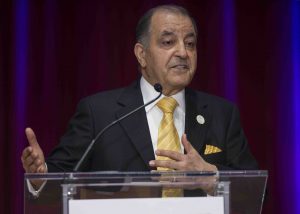 Leadership Qualities
Leadership Qualities
SG: The No. 1 quality of a good leader is to give people self-confidence. I challenge people in the following way. There are five or six industrial gas companies … one will be the best, safest, and most profitable. Are we going to say we are inferior? Of course not. So let’s be the best. Leaders must be supportive of the people. They must be genuine. Leaders need a plan and must articulate that plan in a very clear way and not change course every day. Finally, a leader must know what is going on.
Skill to Develop as a Student
JK: Communication is the key to everything. As a student, I didn’t like public speaking and would get nervous. Then I became proactive. Every conversation you have in business is selling you. And strong communication skills are translatable across all industries. It’s also important to surround yourself with the right people. Experts help to steer us in new directions that would have taken me and my team a year or two to figure out for ourselves.
TR: Mentors are available. Find them, talk to them, and listen to them. When I planned to open the coffee shop, I found help from other specialty coffee shops in Kutztown, Baltimore, and Washington, D.C. And remember that any success you have comes in part from others.